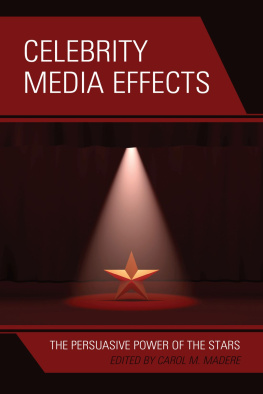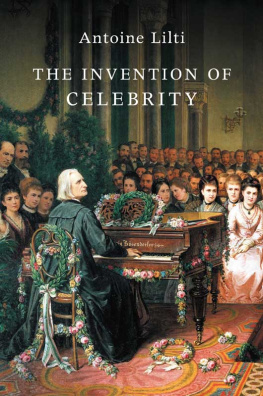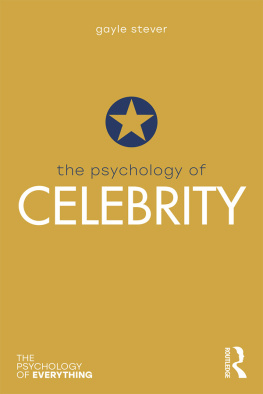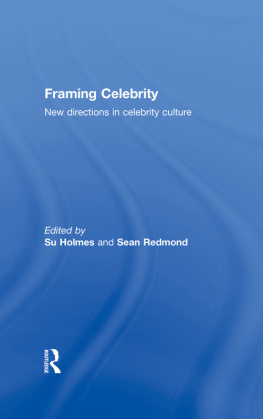Celebrity Media Effects
Celebrity Media Effects
The Persuasive Power of the Stars
Edited by
Carol M. Madere
LEXINGTON BOOKS
Lanham Boulder New York London
Published by Lexington Books
An imprint of The Rowman & Littlefield Publishing Group, Inc.
4501 Forbes Boulevard, Suite 200, Lanham, Maryland 20706
www.rowman.com
6 Tinworth Street, London SE11 5AL, United Kingdom
Copyright 2018 The Rowman & Littlefield Publishing Group, Inc.
All rights reserved . No part of this book may be reproduced in any form or by any electronic or mechanical means, including information storage and retrieval systems, without written permission from the publisher, except by a reviewer who may quote passages in a review.
British Library Cataloguing in Publication Information Available
Library of Congress Cataloging-in-Publication Data Is Available
ISBN 978-1-4985-7780-9 (cloth: alk. paper)
ISBN 978-1-4985-7781-6 (electronic)
 The paper used in this publication meets the minimum requirements of American National Standard for Information SciencesPermanence of Paper for Printed Library Materials, ANSI/NISO Z39.48-1992.
The paper used in this publication meets the minimum requirements of American National Standard for Information SciencesPermanence of Paper for Printed Library Materials, ANSI/NISO Z39.48-1992.
Printed in the United States of America
Contents
Carol M. Madere
Joshua N. Morrison
Kevin Marinelli
Michael Moeder and Chrys Egan
Leandra H. Hernandez
Dinah Tetteh and Shrinkhala Upadhyaya
Elizabeth R. Hornsby
LaKesha N. Anderson
Kristin Comeforo
Kay M. Beckermann
Nancy Van Leuven, Thomasena Shaw, and Faith Sidlow
Joseph E. Burns
Amber Narro
Carol M. Madere
One of the many books and articles on the cult of celebrity contains the observation that celebrity culture surrounds us, but I believe the culture of American society is celebrity culture, that the two are so intertwined that one cannot be distinguished from the other. This fascination with celebrities from chefs to athletes to people who are only famous for being non-celebrities in a reality TV show permeates how Americans view themselves: how they vote, the causes they give to and care about, the products they buy, their health concerns, and even how they view motherhood.
Much scholarly attention has been paid to how the cult of celebrity developed and the connection between the production and consumption of celebrity. Individual journal articles have explored particular aspects of the effect of celebrity on American culture. This book attempts to integrate these scholarly pursuits into a thorough exploration of the effect of celebrity on Americans public and private lives. It is a meta-analysis of Americas entertainment orientation.
According to Fred Inglis in A Short History of Celebrity , Celebrity is everywhere acknowledged but never understood (p. 4). Inglis believes that to understand the power of celebrity, one must notice how celebrity has replaced the concept of renown. Renown, says Inglis, was once assigned to people of high accomplishment, a jurist, a cleric, or a scholar, for example. Renown brought honour to the office not the individual, and public recognition was not so much of the man himself as of the significance of his actions for society (Inglis, p. 4). Inglis maintains that the notion of celebrity which we have today is no more than a 250-year-old phenomenon that started in London with the urban leisure brought about by the beginnings of the Industrial Revolution. Early celebrities were Dr. Samuel Johnson and his circle of public opinion leaders, Lady Mary Wortley Montagu and the lead she took as a solitary woman tourist (who even managed to get into the Sofia mosque disguised as a man), Alexander Pope, and Joshua Reynolds (p. 8).
These throngs of biography, vastly magnified by the fat figure of the Prince Regent, gradually effected the institutionalisation of the underlying forces which composed celebrity: first, the new consumerism of eighteenth-century London; second, the invention of the fashion industry with department stores to match in mid-nineteenth century Paris; third, the coming of the mass circulation newspaper, its gossip columns, and its thrilled, racy transformation of city life in New York and Chicago into the glitter of publicity. (p. 9)
Paris, according to Inglis, was the first place to put appearance at the center of celebrity, and together with London and New York: the leisure timetable, window-shopping and haute couture, money and the gossip columnthe mechanisms of celebrity take on their modern outline from these forces (p. 10).
Conditions of Celebrity Today
Graeme Turner, in his book Understanding Celebrity , says todays celebrities are highly visible through the media, and their private life will attract greater public interest than their public achievements. In fact, once established, the celebritys fame is likely to outstrip whatever achievements made him or her famous in the first place. As the example of Kim Kardashian suggests, the public interest a twenty-first-century celebrity excites seems disproportionate to whatever skill or talent the celebrity possesses, which is one reason why celebrity is often regarded as the epitome of the inauthenticity or constructedness of mass-mediated culture (Franklin, 1997) (Turner).
However, Turner himself finds that celebrities perform productive social functions, for example, para-social interactions that operate as a means of compensating for changes in the social construction of the communities within which many of us live (Turner). These are instances where large numbers of people around the world respond to what they think of as real emotional attachments with figures they know only through their representations in the media, such as Princess Diana.
Robert Putnams book Bowling Alone: The Collapse and Revival of American Community (2001) noted a shift in American culture toward a loss of community. Americans are finding some of their closest relationships to be in decline, including both the family and the wider community. Some people compensate for this loss of social contact with para-social interactions (interactions with people they dont know) such as celebrities.
Another productive social function of celebrity is elaboration of the definition of the individual. According to Turner, most accounts of the history of celebrity relate it to, among other things, the pairing of the growth of individualism with the rise of democracy.
As a result, it is suggested, celebrity operates at the very centre of the culture as it resonates with conceptions of individuality that are the ideological ground of Western culture (Marshall, 1997, p. x). Marshall describes celebrity as one of the fundamental mechanisms for constructing and maintaining the discursive linkages between consumer capitalism, democracy, and individualism. If Marshall is right, then celebrity has a crucial ideological function (Turner).
Whether it is a productive social function or not, some scholars argue that while celebrity culture is not a direct substitute for religion within contemporary society, there is a relationship between them. Rojek (2001) argues, To the extent that organised religion has declined in the West, celebrity culture has emerged as one of the replacement strategies that promote new orders of meaning and solidarity (p. 99).
Some of the contributors in this collection argue that celebrities make other productive contributions to society. Joshua Morrison begins with an explanation of how celebrity is constructed. Then, Leandra Hernandez discusses the anti-sexual assault advocacy efforts of Mariska Hargitay. Dinah Tetteh and Shrinkhala Upadhyaya describe the health awareness created by Angelina Jolies medical announcements. LaKesha Anderson recounts how celebrity sufferers of postpartum depression have made the condition better understood and socially acceptable. Kristin Comeforo discusses the feminist activism of Beyonce and Emma Watson and how competing approaches to feminism have enriched the publics understanding. Nancy Van Leuven, Thomasena Shaw, and Faith Sidlow describe the efforts of celebrities to encourage their fans to support victims of hurricanes Harvey, Irma, and Maria in 2017.








 The paper used in this publication meets the minimum requirements of American National Standard for Information SciencesPermanence of Paper for Printed Library Materials, ANSI/NISO Z39.48-1992.
The paper used in this publication meets the minimum requirements of American National Standard for Information SciencesPermanence of Paper for Printed Library Materials, ANSI/NISO Z39.48-1992.